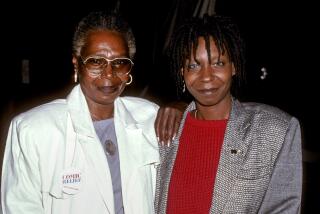Dick Berg dies at 87; television and film writer and producer
- Share via
Dick Berg, a longtime television and motion picture writer and producer, died Tuesday from a fall at his home in Los Angeles. He was 87.
A pioneer of the made-for-television movie format that revolutionized network programming in the 1970s, Berg helped launch a generation of young directors, including Sydney Pollack, Mark Rydell, Robert Ellis Miller and Stuart Rosenberg. He was also the patriarch of a family prominent in Hollywood, with three sons who followed him into the entertainment industry and a fourth who became a famous biographer.
Richard J. Berg was born in New York City on Feb. 16, 1922, and grew up in New Rochelle, N.Y.
After graduating from Lehigh University in 1942, he traveled to Hollywood to pursue a career in acting or producing and found work as a dialogue coach for Roy Rogers and other cowboy actors at Republic Pictures.
After several years, Berg returned to the East Coast, where he ran Poor Richard’s Art Gallery and the Paint Bucket, an art supply store in Westport, Conn. At night and on weekends, he began writing scripts on speculation for live television during the last years of its Golden Age. More than a dozen of his original dramas appeared on such series as “Kraft Television Theatre,” “Robert Montgomery Presents,” “Studio One” and “Playhouse 90” in the late ‘40s and the ‘50s. One of them, “The Drop of a Hat,” was adapted for the stage and caught the attention of Hecht-Hill-Lancaster Studios, which brought Berg to Hollywood as a screenwriter in 1957.
Over the next few years, Berg worked on numerous scripts at MGM and 20th Century Fox before Universal Studios put him under a long-term contract. He began by creating the 1959-60 television detective drama, “Johnny Staccato,” starring John Cassavetes.
While always keeping his hand in the writing of scripts, Berg spent most of the 1960s producing television at Universal, starting with the detective program “Checkmate,” about an investigative agency in San Francisco that tried to protect people targeted by criminals.
With the demise of live television in New York, Berg tried to re-create the excitement of the early days of the medium by producing “Alcoa Premiere” and “Bob Hope Presents the Chrysler Theatre,” dramatic anthology shows for which he was able to hire such writers as William Inge and J. P. Miller to write original teleplays. This mixture of drama, variety and event specials attracted such actors as Robert Redford, Simone Signoret, Anne Bancroft, Rod Steiger, Cliff Robertson, Jason Robards Jr. and Lee. J. Cobb.
At the end of the ‘60s Berg produced a few motion pictures, including “House of Cards,” with George Peppard and Orson Welles, and “Counterpoint,” starring Charlton Heston and Maximilian Schell.
But television was his passion, because of its faster pace and larger audiences.
For the next 30 years, Berg’s Stonehenge Productions produced dozens of movies of the week and miniseries for commercial and cable television.
Most had some historical value or social relevance, and many were adapted from bestselling books; among them were “Wallenberg,” starring Richard Chamberlain; James Michener’s “Space”; Ray Bradbury’s “The Martian Chronicles”; Irving Wallace’s “The Word”; Philip Caputo’s “A Rumor of War”; and Elmore Leonard’s “Pronto.”
Berg’s early work in television would lead to a long friendship with another budding writer trying to break into the business, Rod Serling, with whom he would play paddle tennis and gin rummy every Saturday morning.
“They told each other jokes and kidded each other a lot,” said Serling’s widow, Carol. “It was a very deep and mutual friendship that lasted for many, many years.”
Actor Cliff Robertson said he would frequently drop by Berg’s home -- he was the exception to the rule that actors weren’t allowed to intrude on the family.
Robertson described Berg as a positive person who never lost his youthful enthusiasm for his work.
“Even as he got older, he never lost that buoyancy,” he said.
Robertson said he had great love for Berg, who shared a disdain for what he described as the “less creative” aspects of the entertainment business.
“He had a great love of family,” Robertson said. “He didn’t get into the livelier side of Hollywood.”
Berg’s son A. Scott Berg, the Pulitzer Prize-winning author, said his father encouraged his children by example. Some of his most vivid childhood memories are of his father, hunched over in his office, writing on a yellow legal pad with a No. 2 pencil.
“I grew up with such a strong image of a writer at work. That’s who my father was to me. To my brothers, he was more of a producer at work,” Scott Berg said. “He would always say, ‘You kids don’t want to go into show business.’ And there would be a wink of the eye, because we knew he loved it and we saw how well he did it.”
Berg served two terms as president of the Hollywood Chapter of the National Academy of Television Arts and Sciences. In 2000, the American Film Institute presented him with the Charles Fries Producer of the Year Award for his contributions to the profession.
In addition to his son Scott, Berg is survived by his wife of 63 years, Barbara; their three other sons, Jeff, who is chairman of International Creative Management talent agency; Tony, a record producer and executive; and Rick, a manager and producer; and seven grandchildren.
Services will be private. Memorial donations can be made to the Writers Guild Foundation.
More to Read
Start your day right
Sign up for Essential California for the L.A. Times biggest news, features and recommendations in your inbox six days a week.
You may occasionally receive promotional content from the Los Angeles Times.







